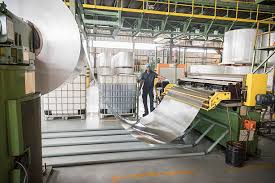Nigeria’s manufacturing sector has continued to experience slow growth, with fresh figures from the National Bureau of Statistics (NBS) showing that the sector declined further in the second quarter of 2025, largely due to poor efficiency at the nation’s seaports.
According to the latest Gross Domestic Product (GDP) report, the manufacturing sector’s real contribution to the economy in the second quarter dropped to 7.81 per cent. This represents a decline from 9.62 per cent recorded in the first quarter of 2025, and also lower than the 8.01 per cent contribution in the same quarter of 2024.
The NBS figures further revealed that the sector managed to grow by 1.60 per cent year-on-year, which was higher than the same quarter of 2024. However, the report noted that this growth rate was 0.47 percentage points lower than the annual rate of the previous quarter and 0.09 percentage points weaker on a quarterly basis. On a quarter-to-quarter basis, the performance fell sharply by 15.81 per cent, showing that the sector is under intense pressure.
The statistics also indicated a poor showing in nominal GDP terms. The manufacturing sector grew by 4.51 per cent year-on-year, but this marked a drop of 3.14 percentage points when compared with the same period in 2024. More worrying was the 37.89 percentage point decline from the strong 42.40 per cent growth recorded in the first quarter of 2025. On a quarter-to-quarter comparison, growth slid further by 31.72 per cent. This left the sector’s contribution to nominal GDP at 6.87 per cent, lower than the 7.84 per cent in 2024 and the 10.78 per cent achieved in the first quarter of 2025.
Reacting to the development, the Director-General of the Manufacturers Association of Nigeria (MAN), Mr. Segun Ajayi-Kadir, expressed worry that the productivity of manufacturers has weakened because of the backlog of inputs stuck at the ports. He explained that the congestion at the ports was hurting businesses. “Domestic manufacturing is still struggling, and more needs to be done by the government to mitigate the decline. I also believe that we should ease the process. We should ease the situation at the port. For the past few weeks, we’ve been encountering challenges with the buildup. People are not able to clear their goods,” Ajayi-Kadir said.
The sector’s struggles are further highlighted by Nigeria’s widening trade deficit. Figures from the NBS show that the country imported manufactured goods worth N15.39 trillion in the first half of 2025, while exports stood at only N1.09 trillion, leaving a deficit of N14.3 trillion. This imbalance has become a major concern for stakeholders in the industry.
Although manufactured exports showed some recovery in the second quarter, rising to N803.81 billion, this only represented a 173 per cent increase from the first quarter and a 67.17 per cent improvement year-on-year. Industry experts say the growth is not strong enough to close the gap between imports and exports.
Mr. Ajayi-Kadir of MAN described the situation as a confirmation of the long-standing challenges facing local manufacturers. He stressed that urgent action was needed to stop the deficit from widening further. Similarly, the President of the Lagos Chamber of Commerce and Industry (LCCI), Mr. Gabriel Idahosa, said the deficit was largely caused by insufficient raw materials within the country, forcing manufacturers to depend heavily on imports. “The N14 trillion deficit in manufacturing in H1 2025 is due to an imbalance in raw materials as manufacturers look outside because there are insufficient local raw materials,” Idahosa explained.
Stakeholders are now calling on the Federal Government to fast-track the implementation of the Nigeria First policy. The policy requires ministries, departments, and agencies to give priority to locally manufactured goods when making procurement decisions. According to them, this would provide a lifeline to struggling industries and boost the demand for made-in-Nigeria products. They also urged manufacturers to take advantage of state-level power generation initiatives to ease the burden of high energy costs, which remain a significant obstacle for businesses across the country.
The manufacturing sector, which covers 13 key activities including food and beverages, textiles, chemicals, cement, motor vehicle assembly, and other industrial products, remains an important driver of Nigeria’s industrialisation plans. However, with its contribution to GDP declining and the trade deficit growing, experts warn that the challenges may persist if urgent reforms are not introduced to address bottlenecks at the ports, reduce the cost of production, and improve local capacity for raw materials.
Many analysts believe that unless the government implements practical steps to address these challenges, Nigeria’s industrial growth will continue to face setbacks. The latest report from the NBS serves as a reminder that the country’s manufacturing base is yet to recover fully from structural weaknesses that have slowed its progress for years.
